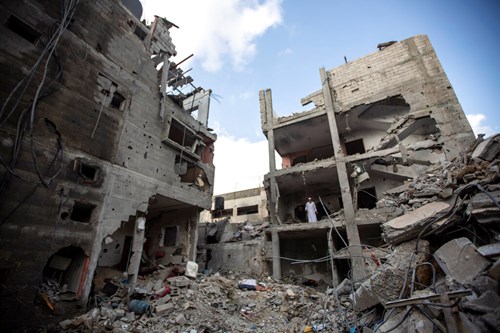What’s next for Israel as its war against Iran proxies and Iran itself has reached the one-year mark since the murderous rampage by Hamas in Southern Israel last Oct. 7?
U.S. President Joe Biden has made a couple of requests, discouraging Israel from attacking Iranian oil fields and nuclear facilities. But all signs indicate Israeli Prime Minister Benjamin Netanyahu is not about to grant Biden’s wishes. In fact, Israel has given no assurances that it won’t target Iran’s nuclear facilities, a top State Department official has told CNN.
Noted Middle East analyst Joel Rosenberg said on American Family Radio Monday that the Jewish nation has no choice but to go after Iran’s nukes. The destruction of Hamas and the inevitable destruction of Hezbollah has led to what he calls an historic window of opportunity, Rosenberg told show host Jenna Ellis.
“The question is: Will Israeli Prime Minister Benjamin Netanyahu pull the trigger?” Rosenberg offered.
As the Oct. 7 anniversary arrives “we’re heading into the most dangerous week of the war,” Rosenberg wrote on X over the weekend. “A massive war with Iran is looming. Only the Lord knows how this is going to play out. But one thing is clear: Israel cannot let Iran get The Bomb.”
Insanity from Israel’s most powerful ally
Netanyahu over the weekend blasted French President Emmanuel Macron and the governments of Great Britain and Canada who have stopped selling weapons to Israel while pushing for a ceasefire in the Middle East.

“President Biden is doing everything he can, [along with] the international community, to pressure Israel to accept a cease fire. That's insane,” Rosenberg argued.
Calls from Biden and other world leaders create a “big test” for Netanyahu. The prime minister won’t be swayed, and an Israeli attack against Iran could come by the end of today’s mournful remembrance, Rosenberg predicts.
“It’s very possible that before the day is over, Netanyahu is going to launch this massive military attack against the Iranian regime that no one ever has. No one has ever actually attacked the Iranian regime and made them pay for all the Americans they've killed, all the Israelis they've killed, all the Sunni Arab moderate Muslims they've killed, all the evil they've done,” he said. “This might be the day; this might be the week.”
For years Iran has waged war with willing partners like Hamas, Hezbollah and the Yemen-based Houthis.
An important consideration in trying to guess Netanyahu’s next move is this: Iran itself has attacked Israel twice.
“Strategically, after Iran launched a direct attack on Israel, this wasn’t a proxy, this wasn’t Hamas, this wasn’t the Houthis, this wasn’t Hezbollah. To me that says all options should be on the table for Israel,” Daniel Cohen, news director for the Real Life Network, said on Washington Watch Friday.
Biden has expressed concerns that an attack on Iran’s nuclear facilities would lead to a wider war and that it would damage diplomatic efforts to address Iran’s nuclear ambitions.
Gen. Jerry Boykin (USA-ret.), now a Family Research Council executive vice president, told Cohen that Israel has the power to cripple Iran economically without going after its nuclear sites or oil fields.
“He said Israel doesn’t have to take out oil, [that] just taking out the ports would cripple the economy. All options are on the table – and the Israelis, as we’ve seen in the last few weeks, are very creative and can do pretty much whatever they want,” Cohen said.
Israel success against Hamas, Hezbollah
The timing looks especially favorable for an Israeli attack in light of the nation’s success against Hamas and Hezbollah, Rosenberg said.
 “Hamas is essentially decimated in Gaza. Yes, there will be cleanup operations. It's not over, but strategically Hamas is defeated, truly defeated in Gaza,” he said. “That war is essentially over.”
“Hamas is essentially decimated in Gaza. Yes, there will be cleanup operations. It's not over, but strategically Hamas is defeated, truly defeated in Gaza,” he said. “That war is essentially over.”
And the war with Hezbollah, he continued, is trending in that direction. “Hezbollah is a shattered wreckage of its former self,” Rosenberg said. “I'm not saying it's over. They still have maybe 75,000 [to] 80,000 missiles, so we have to keep working.”
Intelligence estimates by both the U.S. and Israel say that 50% of Hezbollah’s missile arsenal has been destroyed in the last few weeks. On top of that, Rosenberg pointed out, 18 Hezbollah terror leaders have been assassinated, including Hassan Nasrallah, its leader of 32 years. And thousands more Hezbollah fighters were killed or severely wounded in the attack of exploding pagers and mobile radios.
Rosenberg: The time is now
All of this, says the acclaimed author, casts Iran in a different light.
“Suddenly, Iran's right and left hands – Hezbollah and Hamas – are either destroyed or decimated or limping. Those two forces were built not just to terrorize Israel, but to prevent Israel from ever launching a preemptive strike to decapitate the Iranian regime, to neutralize the Iranian nuclear weapons program and destroy Iran's oil refinery capacity and bring the Iranian regime economically and militarily to its knees,” Rosenberg said.
“Suddenly, the Iranian regime is vulnerable.”







